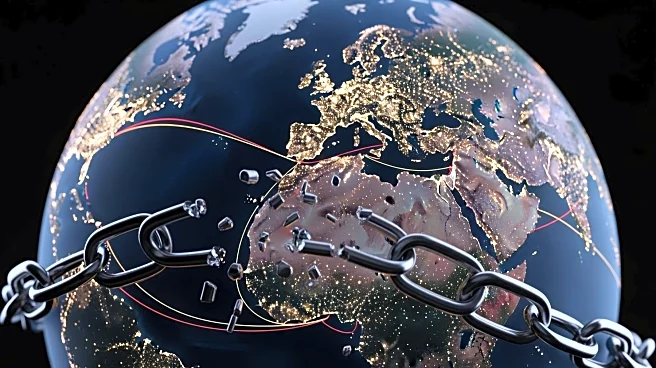What's Happening?
The United States, under pressure from President Trump, has successfully blocked the adoption of the world's first global carbon fee on shipping emissions during an International Maritime Organization
(IMO) meeting in London. The proposed regulations aimed to impose a fee on carbon pollution to mitigate the environmental impact of shipping. Despite initial agreements among major maritime nations, the decision was postponed for a year following Trump's influence, along with support from Saudi Arabia and other countries. The delay highlights the global reach of Trump's climate policies, as he has labeled climate change a 'con job.' The U.S. threatened retaliatory measures, including tariffs and visa restrictions, if the regulations were adopted.
Why It's Important?
The postponement of the carbon fee regulations has significant implications for global efforts to combat climate change. Shipping emissions account for approximately 3% of global emissions, and the industry requires clear regulations to invest in decarbonization. The delay leaves the sector in uncertainty, potentially hindering progress towards reducing greenhouse gas emissions. The decision reflects geopolitical tensions and the influence of the U.S. in international climate policy, affecting countries that are most vulnerable to climate change impacts. The outcome may also influence upcoming climate negotiations, such as the COP30 summit in Brazil.
What's Next?
The IMO will continue negotiations over the next year to reach a consensus on the carbon fee framework. Stakeholders, including environmental groups and maritime industry representatives, are expected to advocate for the adoption of the regulations. The delay may prompt countries to strengthen their positions and push for decisive action at future meetings. The shipping industry faces pressure to invest in cleaner technologies and fuels to meet the IMO's net-zero emissions target by 2050. The international community will closely monitor developments, as the decision impacts global climate strategies and the future of shipping emissions.
Beyond the Headlines
The postponement of the carbon fee regulations raises ethical and legal questions about the responsibility of developed nations in addressing climate change. The influence of political leaders on international environmental policies highlights the challenges of achieving global consensus. The decision may also affect public perception of climate justice and the role of international organizations in enforcing environmental standards. Long-term shifts in shipping practices and investments in sustainable technologies could be delayed, impacting efforts to transition to a low-carbon economy.









